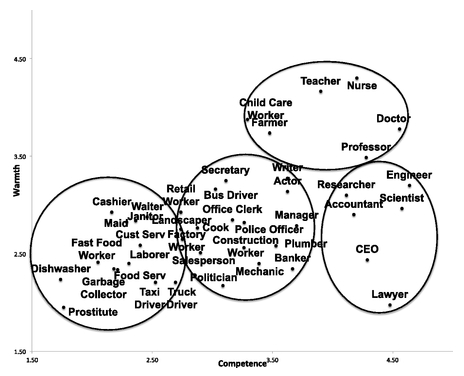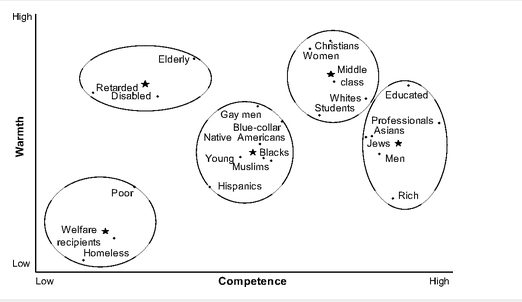
Are We Getting Squeezed by Lemon Growers?
September 25, 2014
Weekly Roundup: From Lemons to Longevity
September 27, 2014After reading a paper on job warmth and competence from two Princeton scholars, I wondered about its broader significance.
While the paper’s authors said their goal was to assess “communication credibility,” my takeaway was somewhat different.
But first, let’s start with the researchers’ bubble diagrams that show where warmth (friendly, trustworthy and well-intentioned behavior) and competence (good with knowledge and skills) converge for different jobs. Indicating a survey group’s opinion, the paper’s authors emphasize the results do not represent facts about each profession. They just convey stereotypes expressed by 116 participants. (Interesting to note the position of politician.)

From: “Gaining trust as well as respect in communicating to motivated audience about science topics”
The study also looked at social group images but not, the authors again point out, facts about each group.

From: “Gaining trust as well as respect in communicating to motivated audiences about science topics”
Yes, the purpose of the researchers was to set the scene for assessing how successfully climate scientists communicate. However, I liked how these bubble diagrams provided a springboard for thinking about the learning that economists call human capital development.
As Aristotle recognized centuries ago, learning is about more than knowledge. Adding character and emotion to a learning recipe takes you beyond logic and information. People who successfully combine all four attributes achieve what the study’s authors call communicator credibility. Not only can they perform their job but also they can convincingly influence others.
Teachers’ Warmth and Competence
Having just completed an hour-long econtalk podcast on teachers’ efficacy, I took their conclusions to the world of education.
With teachers you can see on the above diagram that relative warmth somewhat exceeds competence. The podcast–a discussion of teacher competence–points out that loving children is not the most important attribute for a teacher. Rather, it is competence that makes a good educator. To nurture that competence, we should emphasize the classroom. We can help future educators practice learning and disciplinary techniques and the skills needed for decomposing learning into smaller steps. We can value the art of teaching as much as we respect the knowledge of an academic discipline.
Our Bottom Line: Human Capital Formation
Indeed, every job has its naturals. But most professionals need to have had the human capital training that has always been about more than depositing facts into people.
![econlifelogotrademarkedwebsitelogo[1]](/wp-content/uploads/2024/05/econlifelogotrademarkedwebsitelogo1.png#100878)



